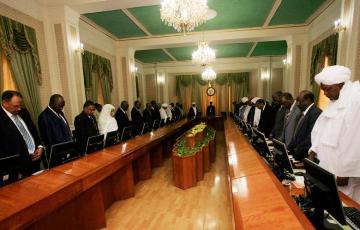Sudan’s cabinet okays proposed budget cuts
June 19, 2012 (KHARTOUM) – The Sudanese council of ministers on Tuesday held an emergency session chaired by President Omer Al-Bashir and approved proposed amendments to the country’s 2012 budget.

The cabinet session also approved a number of laws aimed at reducing state expenditure. Those include a law reducing the number of the Supreme Court’s judges from seven to nine, members of the Political Parties Council from four to eight, members of the National Elections Commission (NEC) from nine to five and the Human Rights Commission from 15 to 11 members.
Furthermore, the council decided to reduce spending on participation of state officials in occasions taking place abroad by 25 percent, cut state fuel quotas by 15 percent and personal contracts in civil service by 50 percent.
The cabinet also decided to take a number of measures to mitigate the burden on ordinary citizens as a result of austerity measures, including rises in salaries of state employees and pension-holders, exemption from added value taxes for imports of medicines and production materials, reduction of import taxes on raw oil from 10 to 3 percent as well as waving taxes and import fees of wheat and sugar.
The cabinet session follows a speech in which President Al-Bashir addressed the parliament on Monday and highlighted a number of serious austerity plans his government intends to implement in order to make up for a budget deficit of 2.4 billion USD.
Following the cabinet session, the official spokesperson of the council of ministers, Omer Mohammed Salih, told reporters that the amendments introduced into the budget were necessitated by a number of challenges represented in the decline of revenues due to the stoppage of transporting oil from the south as well as increases in defense and security spending.
Salih said that the issue of reducing the number of portfolios in the cabinet would be discussed at a later stage since that such decisions fall within the mandate of the presidency of the republic.
Sudan’s economy has been grappling with soaring inflation and a depreciating currency since the country lost three quarters of its oil production with the secession of South Sudan in July last year.
Inflation jumped to 30 percent in May, mainly on food prices, as the Sudanese pound continues to reach new lows on the black market for hard currency.
(ST)
